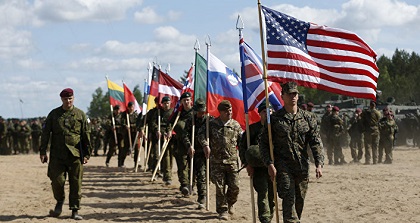
Germany grants NATO forces on its territory the use of military installations and training areas free of charge–airfields, barracks, schools, hospitals, and logistics facilities. Thousands of housing units have been placed at the disposal of the stationing countries. The financial value of German support for Allied bases is balanced in some degree by the impact of Allied wages paid to German employees, orders by Allied forces placed with German firms, and spending by soldiers and their families in Germany. By the 1980s and the 1990s, the physical burden of providing bases for large numbers of Allied troops had become a cause of widespread complaint. Low-level training flights and large-scale exercises that sometimes result in injuries and property damage are particular sources of discontent, especially when carried out at night or on weekends.
By early 1995, about 100,000 United States troops were still stationed in Germany. United States army forces in Germany include one army headquarters, one corps headquarters, and two divisions; the air force has two air force headquarters, one tactical fighter wing, one combat support wing, one air control wing, and one airlift wing. Armor and other weapons are stockpiled for units in the United States earmarked as reinforcements for Europe.
British forces in Germany numbered about 38,000 in mid-1995. British forces in Germany include one corps headquarters (multinational), one armored division, and an air force group headquarters and two air bases. Belgium and the Netherlands maintain about 10,000 and 3,000 troops, respectively.
France maintained about 15,000 troops in Germany as of mid-1995, reduced from 44,000 in 1989. Most of these troops are part of the Eurocorps. The position of France among NATO countries maintaining forces in Germany is unique. French units are not committed to NATO, and the participation of France in the event of conflict is subject to a decision by the French president. Nevertheless, French staff and troops cooperate in certain NATO exercises and maneuvers.
Related articles:
National Security in Germany
Prussia’s Emergence as a Military Power
Creation of the Bundeswehr
The German Military in Two World Wars
Bundesheer
Bundesmarine
Luftwaffe
Military Justice in Germany
German Uniforms, Ranks, and Insignia
Internal Security
Land Police Agencies
Dissidence and Terrorist Activity
Federal Police Agencies
Police Agencies in Germany
